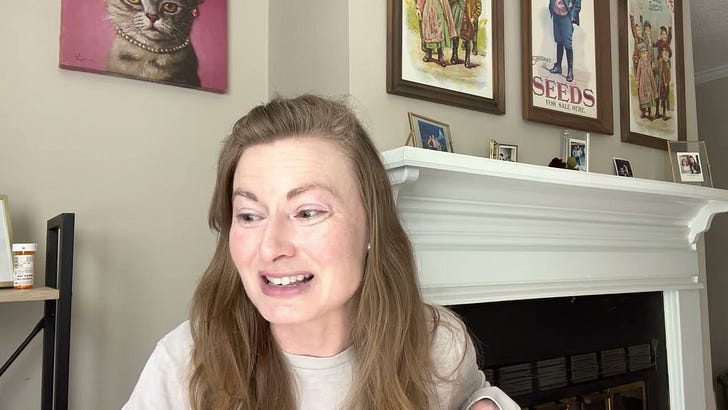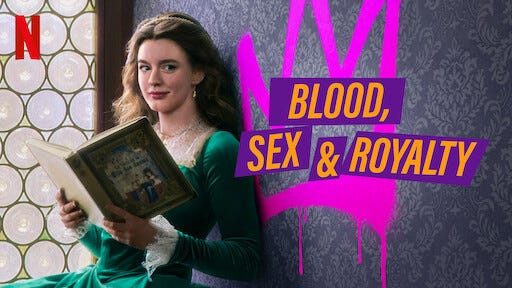Welcome to the 20th TV Tuesday!
Me reading this:
Is there a world where I wouldn’t watch a docudrama series about sex and medieval monarchs? My babies, have you met me?
Until recently, I only really knew anything about politics. So that’s what I argued with people about. But learning medieval and renaissance history means I get to argue with people about that too.
But before I take issue with the facts, let’s talk about the show. Reviewers Daria Romanova and Liz Kocan reviewed the show for (amusingly to me) Collider and Decider, respectively. They both note the show’s steadfast refusal to pick a lane. Is it an outlandish slapstick ahistorical fantasy a la The Great with historian commentary? Is it a lukewarm version of steamy show The Tudors?
They also want more skin if the show is going to have “sex” in the title. However, one of the historians quoted a letter wherein Henry implores Anne to think of him as she puts the gifted venison in her mouth. So, I rest my case.
The best part of the reviews is when Romanova takes on the costumes. “Only partially resembling the lavish 16th-century British fashion, most garbs miss intricate embellishment and look more like what you can purchase online to hang out at the Annual Renaissance fair: visibly cheap fabrics, bright colors, loose fit, and no undergarment structures add up to an overall impression of a makeshift reenactment production with a limited budget.” Hello, police? I would like to report a murder.
I wanted to read more from this saucy wench so I looked up her bio and found out she has a BA in Art History and MA in Fashion Studies, which checks out. Side note: If you want amazing sets and costumes, get thee to The Gilded Age on HBO.
I do have one quibble with Romanova. She writes that the show offers too little historical accuracy for history buffs and too little high-quality drama or saucy parody for a wider audience. Here’s the thing. And I’m embarrassed to admit this. But here it is. I’m simply too stupid for most history. Most history audio goes too fast for me to fully comprehend. There are nearly always names I can’t keep up with, and references to people, ideas, and places I’m not familiar with that mean I end up feeling lost on many occasions. I listen to most history audiobooks at least twice to more fully grok them. Honestly mostly just to keep up with who is who. I’m going to blame my Autism and ADHD for the fact that people’s names are super hard for me. And, as it turns out, they’re kind of important if you want to understand history. It also really helps me to understand what happened if I can hear the same essential story from different writers and/or with a different focus.
Despite my difficulties, I have learned a little about Anne from Young, Damned, and Fair and Stories of the Tudors. And about the reformation from:
Looking back, I listened to all these in the past year! I have an active social life if dead monarchs count as best friends!
All that to say:
1. Yes, I am very cool.
2. Blood, Sex, and Royalty does vastly oversimplify — to the point of misconstruing — certain facts about Anne and the reformation. And here, we’ve reached the fun part: Tussling over historical claims. For example, in a reenactment scene Anne says, at a ball, “Well, some people believe everybody has the right to read the Bible.” The show does get into it, but like at this time Henry was killing less-obvious heretics. In another part Anne says, “No one has any respect for my privacy.” Privacy, and I cannot stress this enough, was just not a salient concept in 16th century life.
I think the show would have benefitted tremendously from having the historians look over the script. But one of them also says something misleading. She claims 16th century women could only be wives, mistresses, nuns, and one or two things I’m forgetting. But she ignores sex workers. And I’m not going to let that go. She also ignores that most medieval women, especially wives, engaged in many forms of paid labor. The term “cottage industry” arose to describe products like textiles and beer that groups of mothers could produce in their literal cottages with kids underfoot.
Historians like
rightly point out that many of our ideas about women — such as the idea that we’re inherently less interested in sex than men or ill-suited to paid labor — are far newer than many people in power would have us believe.Wrapping up this edition of Epic Substack Battles of History, is Blood, Sex, and Royalty good? As Collider and Decider put it, not really, no. What it is, however, is a nice, low-effort watch for dumb neurodiverent people who occasionally enjoy it when things are really, really dumbed down.
Sex and the State is a newsletter at the intersection of policy and people. Like it? Upgrade to a paid subscription, buy a guide, follow me on Twitter, support me on Patreon, or just share this post 🙏
~~~~~
This ⬇️ is an affiliate link! Sign up today to support me!
Join the reading revolution! Get key ideas from bestselling non-fiction books, distilled by experts into bitesize text and audio. Explore our vast library of over 5,500 titles and stay up-to-date with 40 new titles added each month.
















Share this post